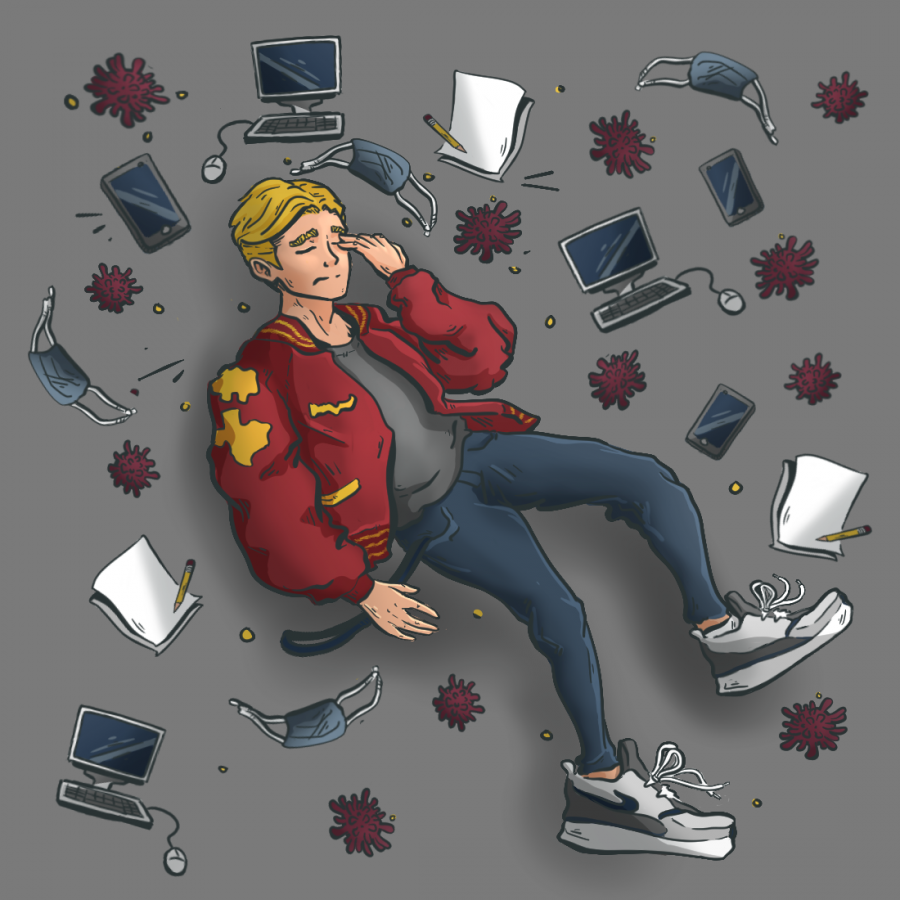Coping with Quarantine
Two students discuss self growth journeys during quarantine
September 30, 2020
A simple trip to the grocery store had never felt so exciting. It started with a restless feeling, a rush to get dressed and a perfume worn that no one would even get close enough to smell. Senior Jessica Carballo had finally left the house for the first time in months, but the catch was that she was sneaking out.
During the past months of physical distancing, more hands-on individuals who find high-fives and hugs simply a part of their daily lives were conflicted. That was Jessica Carballo, who felt like she was pulling away from her friends during the long six-month quarantine.
“I felt like I lost the people I was closest to just because of distance,” Carballo said . “I didn’t get the chance to really see them at all because I have a medical condition that keeps me from getting too close to people.”
In eighth grade, Carballo was diagnosed with Crohn’s disease, which causes inflammation in her lower digestive tract. Due to the medicine she has to take, she has a weakened immune system, making it harder for her to fight off viruses like COVID-19. In the earlier months of quarantine, Carballo’s parents rarely let her go to public places very much, and when they did, she had to take extra precautions to stay safe.
“I would have to take a full-body shower after I went out somewhere,” Carballo said. “Sometimes I wasn’t even allowed to go to the grocery store.”
The disconnection created during March through August crafted a difficult environment for Carballo to navigate. The straightforward schedule of school had been stripped away, leaving her with no foundation. She found herself spending days wearing her pajamas holed up her room. In these times, she entered a state of negative thoughts.
“I was just worrying about what other people were doing, like having a better time than me,” Carballo said. “ I needed to learn how to have fun by myself, how to be okay by myself.”
Through all the mental noise and separation from some of the people closest to her, she often FaceTimed her friends to rekindle their friendship. To cope, Carballo realized ways to reclaim her happiness on her own, But it wasn’t easy at first.
“I regret being sad for too long,” Carballo said . “I realized too late that I am allowed to feel okay, and it won’t make other people feel bad.”
Carballo started finding solace in the little things in her life. From the chamomile tea she would drink, to the leaves rustling outside, she found things to be grateful for. When she piled up all these positive things, she found solid motivation to keep going.
“You can’t keep going day-by-day just living your life like everyone else wants you to,” Carballo said. “You gotta be happy with the simple things in order to be happier with the big things.”
Similar to Carballo’s journey of appreciation in little aspects of the world, Sophomore Julianna Carden altered her mental habits to reveal a more positive self-image. She grew productively from quarantine, while learning how to improve her mental and physical health.
“Pre-quarantine I started to compare myself to others a lot more than before. I know there’s a bunch of summer glow-ups, New Years glow-ups, and so I figured, why not try a quarantine glow-up,” Carden said. “I tried changing my diet and exercise routine in hopes of changing my body to where I liked it. However, I got on the bad side of diet culture and self-esteem. These efforts to make myself fit into society’s beauty standards went completely wrong. My mental and physical health spiraled without my usual support system and group at in-person school to keep it steady.”
As soon as she found herself in a dark place, struggling with her mental and physical well-being, Carden knew she needed a change. She learned mechanisms such as deep breathing, distractions around her, sensory materials, self-soothing, distress tolerance and rational thinking. Carden also learned about the wise mind tactic, which is a balance between emotions and logic.
Carden’s favorite coping mechanism was distractions.
Previously, Carden’s social anxiety rose up and made her believe that everyone was judging her actions and appearance. Soon, she realized that her own physical insecurities got the best of her and took over.
“My insecurities drove me to give everything to change myself,” Carden said. “Eventually, I learned that I don’t need to change, rather I need to accept myself. I realized that I can’t be happy physically without being [unhappy] mentally. And I can’t be happy mentally without having poor physical health.”
She accepted herself though time, tears, and the most effort she’s put towards anything in her life. Every attempt she took to change led her to the same conclusion: she’ll never be happy unless she accepts who she is already.
“There’s no point in changing yourself for others,” Carden said. “Quarantine has taught me so much, and without it I wouldn’t be as healthy mentally and physically as I am today.”



